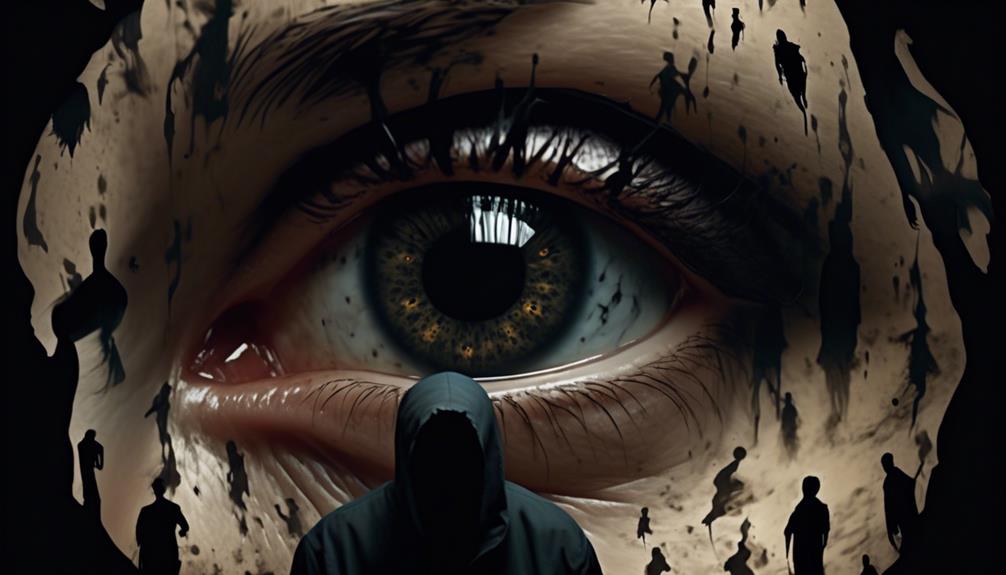Imagine a delightful enigma where the missing piece proves to be unlike what you had originally anticipated.
A UTI, though not typically associated with hallucinations, can sometimes lead to a perplexing phenomenon that bewilders both patients and healthcare professionals alike.
As we explore the intricate relationship between urinary tract infections and hallucinations, it becomes evident that there is more to this puzzle than meets the eye.
Key Takeaways
- UTIs in older patients with delirium can lead to hallucinations.
- Prompt recognition and treatment of UTIs are crucial to prevent cognitive decline.
- Risk factors for UTI-induced hallucinations include diabetes, heart failure, and recurrent UTIs.
- Antibiotics and good hygiene practices are essential for treating and preventing UTIs.
Understanding the UTI-Hallucination Connection
Observing the correlation between UTIs and hallucinations in elderly patients with delirium reveals a concerning connection that warrants further investigation. In older patients, UTIs can lead to altered mental states, including hallucinations, due to the impact of the infection on cognitive function. Elderly individuals experiencing urinary urgency or recurrent UTIs are at a higher risk of developing delirium, which can manifest as hallucinations. Understanding the UTI-hallucination connection is crucial for healthcare providers to recognize and address these symptoms promptly.
Research has shown that blocking the action of IL-6, a protein involved in the immune response, could potentially alleviate delirium in elderly patients with UTIs, reducing the incidence of hallucinations. Studies on mice with UTIs displaying anxiety and memory issues akin to delirium further emphasize the need to delve deeper into this relationship.
This investigation not only benefits elderly patients with UTIs but also has broader implications for conditions like Alzheimer's and Parkinson's disease, where UTIs are prevalent. By comprehending the UTI-hallucination link, healthcare professionals can enhance patient care and outcomes in this vulnerable population.
Symptoms of Hallucinations During UTIs

Symptoms of hallucinations during UTIs in elderly patients can include delusions, unusual behaviors, and changes in behavior.
When older adults experience uncomplicated UTIs, these urinary infections can lead to various symptoms beyond the typical physical discomfort. Here are some key symptoms to watch for in older patients with UTIs:
- Delusions: UTIs can sometimes trigger episodes of confusion and false beliefs in older individuals, leading to delusional thoughts.
- Unusual Behaviors: Older adults with UTIs may exhibit behaviors that are out of character, such as agitation, aggression, or wandering.
- Changes in Behavior: UTIs can cause shifts in behavior, such as increased irritability, withdrawal from social interactions, or heightened anxiety levels.
Recognizing these symptoms promptly is crucial, as UTIs can exacerbate cognitive decline in older individuals, particularly those with underlying conditions like dementia. Timely diagnosis and treatment of UTIs with appropriate antibiotics are essential to alleviate these distressing symptoms and prevent further complications.
Risk Factors for UTI-Induced Hallucinations
Our understanding of the risk factors contributing to UTI-induced hallucinations continues to evolve through comprehensive research and clinical observations.
Several factors increase the susceptibility to experiencing hallucinations during UTIs. Individuals with diabetes mellitus are at a higher risk due to their compromised immune system and potential nerve damage. Patients with heart failure may also be more prone to UTI-induced hallucinations, possibly due to the physiological stress on the body.
Moreover, those with a history of recurrent UTIs or prolonged hospital stays are at an increased risk of developing UTI-induced hallucinations. Additionally, factors such as malnutrition, urinary incontinence, and cognitive impairment can further exacerbate the likelihood of experiencing hallucinations during a UTI episode.
Identifying these risk factors early on and implementing appropriate interventions can help mitigate the occurrence of hallucinations and improve the overall management of UTIs in susceptible individuals.
Medical Explanations for UTI Hallucinations

Elderly patients with UTIs may experience hallucinations due to the development of delirium, a condition characterized by a decline in mental abilities and disoriented thinking. When considering medical explanations for UTI-induced hallucinations, several factors come into play:
- Past Medical History: Individuals with a history of neurological conditions like dementia may be more susceptible to experiencing hallucinations during a UTI episode due to the impact on cognitive functions.
- Clinical Trials: Ongoing research into the relationship between UTIs and delirium is essential in understanding the mechanisms behind hallucinations and cognitive decline, potentially leading to improved treatment strategies.
- Health Care Implications: Recognizing the connection between UTIs and hallucinations underscores the importance of thorough assessments in elderly patients presenting with delirium symptoms, ensuring appropriate management and care.
Treatment and Prevention Strategies
Considering the implications of UTIs on cognitive functions and the importance of thorough assessments, effective treatment and prevention strategies play a crucial role in managing hallucinations in patients with UTIs.
Treatment for UTIs typically involves antibiotics to eliminate the underlying infection causing the hallucinations. Prompt initiation of antibiotic therapy is essential to prevent worsening of symptoms and complications. Additionally, ensuring proper hydration is crucial to help flush out bacteria from the urinary tract and support the body's immune response.
Prevention strategies are equally important in managing UTIs and reducing the risk of hallucinations. Good hygiene practices, especially in children who may be more susceptible to UTIs, can help prevent the spread of bacteria that cause these infections. Encouraging regular bathroom breaks and proper wiping techniques can aid in preventing the ascent of bacteria into the urinary tract. Moreover, staying well-hydrated and practicing safe sex methods can also contribute to UTI prevention.
Frequently Asked Questions
Why Does a UTI Cause Hallucinations?
Hallucinations from a UTI can occur due to the infection spreading to the brain, altering neurotransmitter levels. This can disrupt normal brain function, leading to sensory disturbances like hallucinations.
It's crucial to seek medical attention promptly if experiencing such symptoms, as UTIs causing hallucinations may indicate a severe infection. In some cases, untreated UTIs can lead to a systemic infection, or sepsis, which may result in delirium and confusion. This is often compounded by high fevers, as elevated body temperatures can directly affect brain function, explaining how fever causes hallucinations in some individuals. Timely intervention can prevent complications and ensure a swift recovery.
Treatment with antibiotics can help resolve the UTI and alleviate associated hallucinations.
What Are the Symptoms of a Complicated Uti?
Recognizing symptoms of a complicated UTI in elderly patients is crucial. Signs may include unusual behaviors, pain or itching, and changes in behavior. These symptoms shouldn't be overlooked and require prompt attention to prevent further complications.
Seeking medical assistance for proper diagnosis and treatment is essential to ensure the well-being of the individual. Early intervention can help alleviate discomfort and prevent the UTI from progressing into a more serious condition.
How Long Does Delirium Last After a Uti?
Delirium duration after a UTI can vary based on individual factors. It's essential to consult healthcare providers for personalized assessments and treatments.
Monitoring the patient's recovery progress post-UTI is crucial to gauge the duration of delirium. Timely interventions and follow-up care are key in managing post-UTI complications effectively.
Encouraging open communication with medical professionals can aid in addressing concerns regarding delirium persistence and ensuring appropriate care.
What Are the 3 Main Symptoms of Uti?
The three main symptoms of a UTI are:
- Frequent urination
- Burning sensation while urinating
- Cloudy or strong-smelling urine
It's important to note that these symptoms may vary depending on the individual. If you experience any of these signs, seeking medical advice is crucial for proper diagnosis and treatment.
Ignoring UTI symptoms can lead to complications, so it's essential to address them promptly.
Conclusion
In conclusion, while a urinary tract infection (UTI) doesn't directly cause hallucinations, it can lead to delirium in elderly patients, resulting in symptoms that may be mistaken for hallucinations.
Up to one-third of elderly patients hospitalized with UTIs may experience confusion and reduced awareness of their surroundings.
Proper recognition and treatment of UTIs in this population is crucial to prevent delirium and its associated symptoms.










